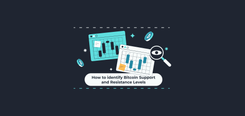Why You Should Use a Decentralized Crypto Exchange (DEX) for Trading
Cryptocurrency trading is a nascent industry which is still growing and making major technological advances — decentralized exchanges, or DEXes, are one of them.
DEXes are not only a leap forward in the crypto exchange world — they’re becoming the go-to method to trade, or swap, crypto tokens.
In this article, we’ll go over the main benefits of DEXes so that as a TabTrader user, you have the knowledge at hand to make an informed decision on where to trade crypto. Continue reading to discover some of the most important pros (and cons) of the constantly innovating world of decentralized exchanges.
What is a Decentralized Crypto Exchange?
A decentralized exchange, or DEX, is a cryptocurrency trading platform which uses automated processes — notably smart contracts and algorithms — to match and execute trades.
Just like “regular” or centralized crypto exchanges, sometimes known as CEXes, DEXes are there to allow traders to swap one crypto token for another. The TabTrader app features both DEX and CEX trading — find out more below.
The main difference between them is that a DEX does not rely on third parties to handle trades and has no central point of failure — all processes occur in a distributed manner, much like the difference between a transacting via a bank and via a decentralized public blockchain such as Bitcoin (BTC).
Decentralized vs. Centralized Exchanges
While centralized and decentralized exchanges aim to provide the same service to users, how they swap one crypto token for another varies considerably.
A CEX typically has a centralized server which handles traffic, this being monitored and maintained by human entities who also take on the role of arbiters — they can decide whether a trade or withdrawal gets approved.
DEXes, by contrast, have no human involvement in the exchange process at all — they rely on algorithmic order matching and smart contracts to execute users’ trades.
Thanks to that setup, there is also no need for centralized equipment and overly centralized potential points of failure. Smart contracts can be stored anywhere, as they are part of the underlying blockchain on which the DEX runs.
That same lack of human participation means that no one can decide arbitrarily whether or not a particular trade is successful or not. Only market conditions can dictate the outcome of a trade, leaving more to the trader’s own skill and experience rather than outside factors.
DEXes also do not feature in-house accounts which need to be funded, removing the risk of hacking and theft or confiscation of funds. There are pluses and minuses to this setup, as the rest of this post will explain.
What are the Benefits of Decentralized Crypto Exchanges for Traders?
Decentralized exchanges have become extremely popular in their few years of existence, and for good reason — they offer permissionless, transparent crypto trading with faster execution and lower fees than their traditional competitors. More than that, they’re constantly improving in an attempt to offer cutting-edge features and remove some of the initial barriers to entry such as the lack of cross-blockchain token swaps.
TabTrader already offers users direct access to the world of DEXes via our integration of OpenBook, a Solana-based decentralized trading platform — find out more below.
The main advantages of DEXes can be summarized as follows:
Security
It’s fair to say that the crypto exchange industry, and less reputable exchanges in particular, have become known for their susceptibility to hackers. Decentralized exchanges help to solve that headache.
Due to their centralized structure, CEXes are a constant target for theft and fraudulent activity. The more crypto an exchange has on its books, the more tempting it is to attack — and even the best-known names in crypto trading sometimes get caught out.
Even if an exchange manages to safeguard its custodied user funds, users themselves can fall foul of bad actors by using poor security practices or becoming a victim of malware.
DEXes remove centralized points of failure such as exchange wallets, while the lack of human involvement reduces the risk of human error. Instead, algorithms execute trades, the conditions of which are held in smart contracts — pieces of code which can be neither altered nor compromised once executed.
Control Over Your Funds
A centralized structure when it comes to crypto trading is a problem for users beyond the danger of hacking — there are other ways that their funds can be lost.
Even under normal circumstances, centralized exchanges are technically able to take control of user deposits at any time, and history has shown that this does in fact occur in reality.
Exchange owners can claim various violations of their terms and conditions — noncompliance with know-your-customer (KYC) demands, “suspicious” activity, etc. — as grounds for quarantining customer crypto tokens.
Sometimes, factors such as high volumes or problems with certain blockchains can result in exchanges exerting additional control over funds and trades.
All these scenarios play out at the user’s expense, and can be mitigated by using a DEX — the absence of a middleman or human third party makes arbitrary usurpation of a trader’s money impossible.
DEX traders decide the terms of a trade using a smart contract, while an AMM handles the trade itself. Neither process involves scrutiny by a third party.
Privacy
It is well known in 2023 that using regular crypto exchanges comes with some considerable privacy trade-offs.
Depending on the jurisdiction, crypto traders are required to submit personal identification before performing certain operations on an exchange, and sometimes before being able to use that exchange at all.
A knock-on effect of this is a large amount of bureaucracy and additional grounds for quarantining user funds, as explained above.
User information, stored after submission, can also be leaked, lost or resold to other parties without the user’s knowledge.
Many crypto traders do not want their identity tied to their tokens, and this is a key reason for the development of DEXes to begin with. DEX trading does not require ID, as there is no party there to check and verify it — a DEX is code, and not a physical entity providing a commercial service.
As such, a trader can use a DEX anonymously, and the only thing required to do so is a wallet address.
Preventing Market Manipulation
Decentralized exchanges are far from perfect, especially given their relatively short history, but have already proven themselves better able to control trade execution and protect the average user.
CEX traders provide the exchange with a lot of personal data, as well as everything about their trades and trading habits by default. This, perhaps naturally, has led to data being used for nefarious purposes, often using the traders themselves as the main victims.
Centralized exchanges have traded against users in the past, making them lose money simply by virtue of interacting with the exchange order book.
Insider trading is another frequent scandal associated with legacy trading platforms — a new token launches, and executives have already amassed it in order to distribute to the market as exchange users buy in.
DEX automation, along with the fact that they do not hold user-submitted data, means that these new-generation exchanges are harder to manipulate.
Decentralized Crypto Exchange Drawbacks
Having only been around for several years, DEXes remain something of an experimental niche — albeit a large one — within the cryptocurrency space. The growth of the industry has been astronomical, but such rapid expansion inevitably comes with associated growing pains.
DEX users thus need to contend with various potential problems which have become commonplace when trading on them.
Despite being fully automated, no one component of the DEX trade is foolproof — smart contracts, liquidity pools and even individual transactions can be targeted by bad actors for financial gain.
DEXes have even become the new home for some legacy exploits, such as the infamous sandwich attack, where a user transaction is rendered unprofitable.
Given the lack of intermediary, users are responsible for their own security — and here is where the freedoms offered by decentralization can become a double-edged sword. Should something go wrong, there is no third-party intermediary to arbitrate disputes or conflicts between traders.
Beyond security, DEXes can themselves become victims should the underlying blockchain on which they are built encounters problems.
A common complaint is high fees — DEX users transacting an ERC-20 token, for instance, may get caught out by high gas fees, leading to their transactions taking much longer than anticipated.
This in turn leaves them vulnerable to a phenomenon called slippage — by the time their transaction hits the DEX, the market is completely different to how it was when they created the transaction, and the order fails or fills at a disadvantageous price.
This same vulnerability is what allows sandwich attacks to succeed and be profitable.
The Bottom Line
Decentralized exchanges are a revolution when it comes to crypto trading, and their rapid expansion is proof of the global demand for automated, permissionless token swaps.
DEXes solve some of the biggest headaches for users of traditional exchanges, and can offer those who would be shut out of the industry thanks to KYC requirements or local laws a chance to trade.
In just a few years, a large number of DEXes have appeared, several of which have become household names.
Their brief but successful history hints at which might come next, as existing platforms grow their user base and new products aim to mitigate the sticking points encountered so far.
When trading on them, however, users need to be aware that they are solely responsible for their experience, and that while “code is law,” as the saying goes, nothing is guaranteed and things can and do go wrong.
A user’s own level of experience can play a key role in the likelihood of being targeted by schemes such as sandwich attacks.
TabTrader offers a wide variety of exchanges and crypto tokens which can be traded all from one convenient terminal. With the latest version of our app, you can begin your trading journey on DEXes via our integration of OpenBook.
OpenBook is a Solana-based order book DEX open for business for TabTrader users — all that’s needed is a Solana-compatible wallet, or better still, our proprietary in-app TabTrader Wallet.
Find out more about TabTrader and OpenBook here.
If you’re ready to enter the world of crypto trading and haven’t done so already, download the TabTrader app, available for iOS, Android and Web.
Need to dive deeper into the nuts and bolts of crypto before starting? The TabTrader Academy is a bespoke education resource with all the answers you need.
FAQ
How Does a DEX work?
A decentralized exchange, or DEX, uses algorithms and smart contracts to offer and fill crypto trades without a middleman. There is no human-controlled order book or other apparatus, including accounts or wallets, under the exchange’s control.
Do DEXes Require KYC?
A key advantage of DEX trading is that anyone can engage in it — the barriers to entry which exist on legacy exchanges do not apply. To use a DEX, all a trader needs is a compatible wallet and the financial means to pay underlying network fees for transactions (such as gas for Ethereum tokens). There are no documents to submit and no one’s permission is needed to use a DEX.
What is The Difference Between a CEX and a DEX?
The terms “CEX” and “DEX” correspond to centralized and decentralized exchanges, respectively. CEX has become the standard term for any legacy trading platform — typically, these have characteristics such as a centralized order book, manual user verification and the ability of executives to decide who trades on the exchange and how much. DEXes, as the term suggests, use decentralized technology — algorithms and smart contracts in the place of a centralized order book and executive control — to execute trades.
Does TabTrader Have a DEX?TabTrader is a trading terminal which offers access to over 30 of the biggest exchanges from one convenient interface. We recently partnered with OpenBook, a Solana-based DEX — now TabTrader users can enjoy DEX trading simply using TabTrader Wallet or any Solana-compatible wallet.




